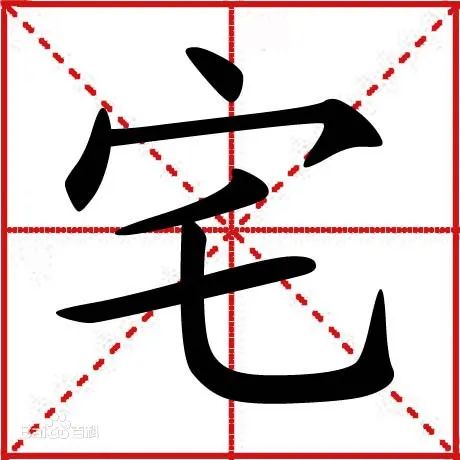- +86-19857418482
- info@chinese-surfing.com
Today's Daily Chinese we would like to introduce an interesting Chinese Character and expression, it's 宅zhái.
The term 宅 (zhái), which today is often used to describe staying at home or being a homebody, has gained significant popularity in recent years, particularly in the context of China's internet culture and the global COVID-19 pandemic. But what is the origin of this word, and how did it come to mean "stay at home"? Let's explore its roots and evolution.

Historically, the character 宅 (zhái) originally referred to a “residence” or “house.” The character is composed of two parts:
⺮ (bamboo radical), which is often associated with structures made from bamboo or wood.
土 (tǔ), meaning “earth” or “ground.”
In ancient China, 宅 was used to describe a home, particularly a private dwelling, separated from public or work areas. The focus was on the idea of a "place to live," a foundation for family and personal life.
For example:
01
住宅zhùzhái - residence; dwelling
02
豪宅háozhái - magnificent house
03
宅院zháiyuàn - a house with a courtyard (Chinese style)
As time passed, 宅 evolved in its usage, taking on a more modern, cultural meaning. In the late 20th and early 21st centuries, the term started to be linked to a specific lifestyle. The development of internet culture, especially among younger generations, introduced a shift where people who preferred staying at home rather than engaging in social or outdoor activities began to be referred to as 宅男 (zhái nán) (homebody men) or 宅女 (zhái nǚ) (homebody women).
The rise of video games, online entertainment, and social media created an environment where young people found comfort and joy in their homes, turning them into a central hub for activities. Instead of being out in the world, they would immerse themselves in digital worlds, often avoiding socializing in the traditional sense. It originally originated from the Japanese Otaku culture.
Nowadays, this word is often used in our daily life as a verb: zhái+zài+place. And it can also be used as an adjective.
For example:
宅男zháinán - Otaku; indoorsman
宅女zháinǚ - Female otaku; indoorswoman
我很宅。Wǒ hěnzhái. - I am very curtilage; I like staying at home.
①我们最近一直宅在家里。
Wǒmen zuìjìn yìzhí zhái zài jiāli.
We've been staying at home lately.
②我不太喜欢宅在家里。
Wǒ bútài xǐhuan zhái zài jiāli.
I don’t like to stay at home very much.
③我宅了好多天了,厨艺也提高了。
Wǒ zhái le hǎoduō tiān le, chúyì yě tígāo le.
I have been home for many days, and my cooking has improved as well.
Related Chinese Language Learning from Chinese Surfing
Latest Blogs about Chinese Surfing